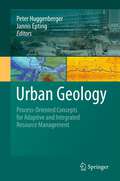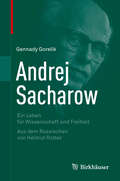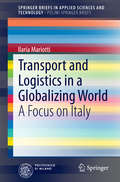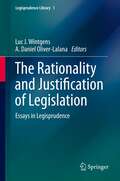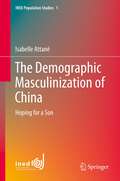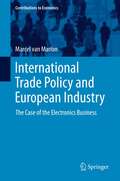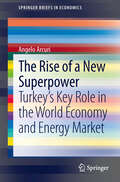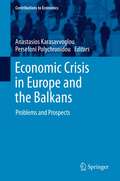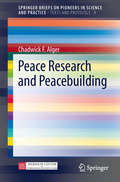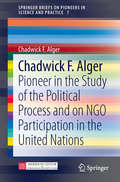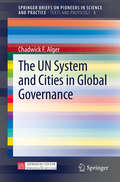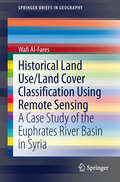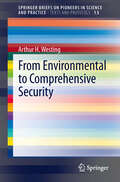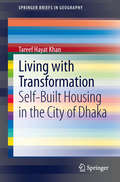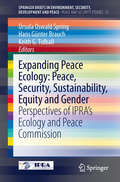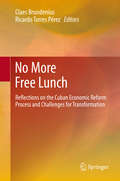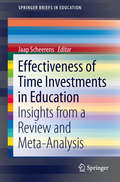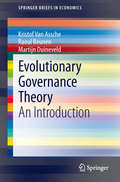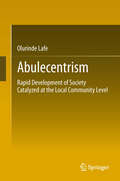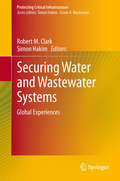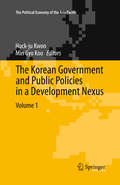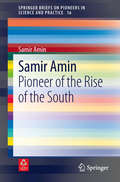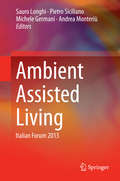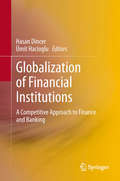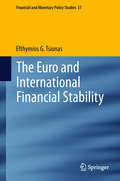- Table View
- List View
Urban Geology
by Peter Huggenberger Jannis EptingUrban subsurface resources and particularly urban groundwater are vulnerable to environmental impacts, and their rational management is of major importance. In this book a multidisciplinary team of specialists and scientists presents innovative process-oriented approaches to the sustainable use of these resources. The included case studies from northwestern Switzerland describe representative environments and are relevant for urban areas in general. They illustrate the protection of groundwater; river restoration; engineering and hydrogeological questions related to urban infrastructure and management concepts; as well as monitoring, modeling and remediation strategies for contaminated sites; problems caused by karst in urban environments; the use of shallow geothermal energy; and natural hazards such as flood events and earthquakes. It is demonstrated that modern quantitative earth sciences can contribute significantly in finding solutions concerning the sustainable use of subsurface resources in urban environments. The book is an invaluable source of information for hydrogeologists, geologists, urban planners, water supply engineers, and environmental agencies.
Andrej Sacharow: Ein Leben für Wissenschaft und Freiheit
by Helmut Rotter Gennady GorelikWie wurde aus dem Physiker Andrej Sacharow ein Vorkämpfer für die Menschenrechte? Darauf gibt diese Biografie eine Antwort, indem sie dem Physiker und der öffentlichen Person gleichermaßen gerecht wird. Gestützt auf bisher unzugängliche Dokumente und Augenzeugenberichte, zeigt der Autor zum einen, dass Spionage zwar den Anstoß zum sowjetischen Kernwaffenprojekt gab, die Wasserstoffbombe jedoch unabhängig davon erfunden wurde. Zum anderen erhellt er Sacharows Beweggründe, 1968 mit seinen regimekritischen Gedanken an die Öffentlichkeit zu treten.
Transport and Logistics in a Globalizing World
by Ilaria MariottiGlobalization of the economy, fragmentation of the production process, increasing externalization of TNCs activities through their global value chains and the widespread adoption of Just-in-Time have increased the flows of raw materials, intermediate goods and finished products, with a direct effect on the transport and logistics industry. This industry, indeed, plays a key role in connecting the different import and export markets and the vertically disaggregated components of production system, which are widespread in the world. The existing literature on transport and logistics is mainly focused on engineering research, transportation economics and management studies, disregarding the view of regional economics, which relates with the impact of economics on space, and therefore, on the impact of internationalisation on a specific industry - transport and logistics and its effects on space. The present book aims to fill the gap in the existing literature by presenting the state of the art of the impact of globalisation and internationalisation of the economy on this industry and focusing on the case of Italy.
The Rationality and Justification of Legislation: Essays in Legisprudence
by Luc J. Wintgens A. Daniel Oliver-LalanaThe essays collected in this book address legislation from the viewpoint of legal theory and provide an overview of current research in legisprudence as a new scholarly approach to lawmaking. The overall focus of the volume is on the justification of legislation, with a special emphasis on the intricate notion of legislative rationality. With the rational justification of legislation as their central theme, the essays elaborate on the foundations and bounds of legislation and the search for a more principled lawmaking, discuss the role of legislation within the framework of democratic constitutionalism, analyze legislation as implementation of constitutional law, and explore how legislative argumentation in parliament can be construed as a source of justification of laws.
The Demographic Masculinization of China: Hoping for a Son
by Isabelle AttanéThis book describes the shortage of girls and women in present day China and focuses on two important features: the sex imbalance in childhood and youth, and the excess mortality of women at various stages of their life. The author analyzes the causes and the processes of a strong preference for sons, which generates discrimination toward females and results in a shortage of girls and women. China's higher proportion of men than women is a population characteristic that is shared by very few countries in the world. This demographic masculinity is unprecedented in the documented history of human populations, both in scale and its lasting impact on the numbers and the structure of the population. Despite the economic boom of recent years, many families in China still consider girls to be less important than boys. Although Chinese women have become largely emancipated since the 1950s, they still do not have the same opportunities for social achievement as men, and Chinese society remains fundamentally rooted in highly gendered social and family roles. As a consequence, Chinese girl babies who have the misfortune to be born instead of a long-awaited son go by various names, such as Pandi (literally "awaiting a son"), Laidi ("a son will follow"), or Yehao ("she'll do too"). The book provides a comprehensive review of the situation of women in China's society and shows that discrimination against girls and women is part of a system of norms and values that traditionally favours males.
International Trade Policy and European Industry: The Case of the Electronics Business
by Marcel Van MarionTrade policy has played a vital role in the decline of European electronics business. The events that resulted in the disappearance of the European television industry, of a European and Japanese video recorder format and of other European consumer electronics are directly related to market structures in exporting countries and business practices. In this book, factual business data shows and economic models explain how restrictive trade practices result in elimination of efficient competitors in export markets. It deals with the memorable case how a videocassette recorder format was established by dumping and how politics enabled it. An innovative tariff increase for CD players was invalidated by heavy dumping, causing closure of production in Europe. European CTV industry succumbed under permanent dumping and a series of biases - as the interest of a state-owned company - and serious errors making trade instruments void and rules irreconcilable with international agreements. Practical and theoretical examples and explanations, some in detail, of trade rules are provided. The book sketches events - carelessness, prejudice or special interests, arbitrary and false application of trade instruments and fraud - resulting in disappearance of various European electronics business segments.
The Rise of a New Superpower
by Angelo ArcuriThe book explains the reasons for the recent economic success of Turkey by examining the transformation of the private sector and the development policies implemented by the Turkish government. Further concrete insights are provided by professionals working for institutional and business players such as SACE, the first Italian insurance group in the field of export credit, and ABIGEM, a business center supporting SMEs in Turkey. Turkish Airlines, winner of the Best Airline in Europe award in 2012, also contributed to the volume through useful information provided by its press office. Turkey's strategic role in the energy market is then analyzed, with discussion of the limits and opportunities of the oil, gas, and renewable sectors. In addition, careful attention is paid to the difficult relations between Turkey and the European Union and to Turkey's application for EU membership. Turkey is one of the most important emerging countries in the world thanks to the booming economic growth that has been achieved there during the past decade. This book analyzes the increasingly key role played by Turkey within the international community by focusing on two main issues: the economic scenario and the energy market.
Economic Crisis in Europe and the Balkans: Problems and Prospects
by Anastasios Karasavvoglou Persefoni PolychronidouThe economies of the European countries are still in recession, the development process is at a standstill, companies are facing financial difficulties, and the EU's monetary policy is tight and focused on lowering inflation. The fiscal problems and high debt levels of the northern European countries are of great importance, and they are the consequences of both the European economy's structural characteristics and the EU's policies. The economic area of Eastern Europe, the Balkans and the Black Sea countries is also vital, due to its special economic characteristics. The effects of the economic crisis on this particular area are catalytic, while the prospects for recovery are doubtful. The present book deals with the key aspects of the economic crisis in Europe, especially focusing on southeast Europe and the Balkans. The consequences of the crisis in these countries are analyzed and suggestions for how to address the crisis are outlined.
Chadwick F. Alger: Peace Research and Peacebuilding (SpringerBriefs on Pioneers in Science and Practice #9)
by Chadwick F AlgerThis is the third volume to commemorate the 90th birthday of the distinguished scholar Chadwick F. Alger to honor his lifetime achievement in international relations, as President of the International Studies Association (1978-1979) and as Secretary General of the International Peace Research Association (1984-1987). After a brief introduction by Chad F. Alger this volume presents six of his key texts on Peace Research and Peacebuilding, covering "The quest for peace: What are we learning?"; "The Emerging Toolchest for Peacebuilders"; "Peace Studies as a Transdisciplinary Project"; "Challenges for Peace Researchers and Peace Builders in the Twenty-First Century: Education and Coordination of a Diversity of Actors in Applying What We Are Learning"; "The escalating peace potential of global governance", "There Are Peacebuilding Tasks for Everybody", and "What Should Be the Foundations of Peace Education?"
Chadwick F. Alger: Pioneer in the Study of the Political Process and on NGO Participation in the United Nations (SpringerBriefs on Pioneers in Science and Practice #7)
by Chadwick F AlgerThis volume honors the lifetime achievements of distinguished scholar Chadwick F. Alger on the occasion of his 90th birthday. Carolyn Stephenson presents Prof. Alger as a Pioneer in the Study of the Political Process and on NGO Participation in the United Nations. Part 1 offers an autobiographical note and a comprehensive bibliography of his academic publications. Part II includes three texts on "The Political Process in the UN," namely "The Researcher in the United Nations: Evolution of a Research Strategy," "Interaction in a Committee of the United Nations General Assembly" and "Interaction and Negotiation in a Committee of the UN GA." In Part III, which focuses on "Civil Society Organizations in the UN System (NGOs)," three chapters deal with "Evolving Roles of NGOs in Member State Decision-making in the UN System," "The Roles of NGOs in the UN System: From Article 71 to a People's Millennium Assembly" and "Strengthening relations between NGOs and the UN system: Towards a research agenda."
The UN System and Cities in Global Governance
by Chadwick F. AlgerThis is the second volume to commemorate the 90th birthday of the distinguished scholar Chadwick F. Alger to honor his lifetime achievement in international relations and as President of the International Studies Association (1978-1979). After a brief introduction by Chad F. Alger this volume presents six of his key texts on The UN System and Cities in Global Governance, focusing on "Cities as arenas for participatory learning in global citizenship"; "The Impact of Cities on International Systems"; "Perceiving, Analysing and Coping With the Local-Global Nexus"; "The World Relations of Cities: Closing the Gap Between Social Science Paradigms and Everyday Human Experience"; "Japanese Municipal International Exchange and Cooperation in the Asia-Pacific: Opportunities and Challenges" and on "Searching for Democratic Potential in Emerging Global Governance: What Are the Implications of Regional and Global Involvements of Local Governments?".
Historical Land Use/Land Cover Classification Using Remote Sensing: A Case Study of the Euphrates River Basin in Syria
by Wafi Al-FaresAlthough the development of remote sensing techniques focuses greatly on construction of new sensors with higher spatial and spectral resolution, it is advisable to also use data of older sensors (especially, the LANDSAT-mission) when the historical mapping of land use/land cover and monitoring of their dynamics are needed. Using data from LANDSAT missions as well as from Terra (ASTER) Sensors, the authors shows in his book maps of historical land cover changes with a focus on agricultural irrigation projects. The kernel of this study was whether, how and to what extent applying the various remotely sensed data that were used here, would be an effective approach to classify the historical and current land use/land cover, to monitor the dynamics of land use/land cover during the last four decades, to map the development of the irrigation areas, and to classify the major strategic winter- and summer-irrigated agricultural crops in the study area of the Euphrates River Basin.
From Environmental to Comprehensive Security
by Arthur H. WestingThis work presents the evolution of the traditional concept of "national security" as military security to additionally embrace "environmental security" and then necessarily also "social (societal) security", thence to be termed "comprehensive human security". It accomplishes this primarily by presenting 11 of the author's own benchmark papers published between 1983 and 2010 (additionally providing bibliographic citations to a further 36 of the author's related publications during that period). The work stresses the importance of transfrontier (regional) cooperation, and also recognizes global overpopulation as a key impediment to achieving comprehensive human security.
Living with Transformation: Self-Built Housing in the City of Dhaka
by Tareef Hayat KhanThis book describes and analyzes the phenomenon of spontaneous transformation in self-built houses in the context of developing countries. After describing briefly the history of self-built houses and the phenomenon of transformation around the world, it focuses on its context, the city of Dhaka. Firstly it describes the physical patterns of spontaneous transformation. Then it explains the explicit reasons behind those transformations. Finally, it carefully unveils the implicit values that are hidden behind those explicit reasons. The entire book is an ethnographic journey, which not only expresses unique stories of living with transformation, but also captivates the reader throughout with its compelling way of qualitative judgment.
Expanding Peace Ecology: Peace, Security, Sustainability, Equity and Gender
by Keith G. Tidball Úrsula Oswald Spring Hans Günter BrauchThis book has peer-reviewed chapters by scholars from Australia, Canada, Germany, Japan, Mexico and the USA that were presented to the Ecology and Peace Commission (EPC) of the International Peace Research Association (IPRA) in November 2012 in Japan. The chapters address these themes: Expanding Peace Ecology - Peace, Security, Sustainability, Equity and Gender; Two Discourses on Global Climate Change Impacts: From Climate Change and Security to Sustainability Transition; Peace Research and Greening in the Red Zone: Community-based Ecological Restoration to Enhance Resilience and Transitions Toward Peace; Social and Environmental Vulnerability in a River Basin of Mexico; Mobile Learning, Rebuilding Community Through Building Communities, Supporting Community Capacities: Post Natural Disaster Experience; Transforming Consciousness through Peace Environmental Education; Building Peace by Rebuilding Community; Ability Expectations and Peace and on Satoyama Sustainability and Peace.
No More Free Lunch
by Claes Brundenius Ricardo Torres PérezIn September 2010, the Cuban government decided to embark on an economic reform program, unprecedented after the Revolution in 1959. This opened up opportunities for Cuban economists and scholars to participate in the development of the reform program. Thanks to grants from SSRC (Social Sciences Research Council, New York) and the Norwegian Ministry of Foreign Affairs, several researchers from the Cuban think tank CEEC (Center for Studies of the Cuban Economy, Havana) got an opportunity to visit countries that could be of interest for the reform process, notably Vietnam, but also Brazil, South Africa and Norway. The result of these field visits and a subsequent workshop involving contributions from Cuban as well as non-Cuban scholars, this volume showcases unprecedented new insights into the process and prospects for reform along many dimensions, including foreign direct investment, import substitution, entrepreneurship and business creation, science and technology development, and fiscal policies. The resulting analysis, in a comparative perspective, provides a framework for future research as well as for business practice and policymaking.
Effectiveness of Time Investments in Education: Insights from a review and meta-analysis
by Jaap ScheerensThis book analyzes the productivity and effectiveness of a variety of time investments in education. It explores the methods used in education to optimize the time that students are exposed to learning content. Such methods include expanding official school time, optimizing "time on task", providing homework assignments, and creating learning opportunities beyond lesson hours. The book presents a review of earlier reviews and meta-analyses, secondary analyses of international data sets, and new meta-analyses concerning the effects of instruction time, homework and extended learning, beyond official school time. It explores the concept of time as a condition to enhance student achievement and discusses methodological issues in separating "genuine" time effects from related facets of educational quality. The book shows that the dependence of time effects on the quality of content choice and delivery raises critical questions for both researchers and policy planners. It further shows that sophisticated research designs are required to properly assess time effects, and that policy makers should be concerned about the bluntness of time as an instrument to enhance educational productivity.
Evolutionary Governance Theory: An Introduction
by Raoul Beunen Martijn Duineveld Kristof Van AsscheThis short books offers the reader a remarkable new perspective on the way markets, laws and societies evolve together. It can be of use to anyone interested in development, market and public sector reform, public administration, politics & law. Based on a wide variety of case studies on three continents and a variety of conceptual sources, the authors develop a theory that clarifies the nature and functioning of dependencies that mark governance evolutions. This in turn delineates in an entirely new manner the spaces open for policy experiment. As such, it offers a new mapping of the middle ground between libertarianism and social engineering. Theoretically, the approach draws on a wide array of sources: institutional & development economics, systems theories, post-structuralism, actor- network theories, planning theory and legal studies.
Abulecentrism: Rapid Development of Society Catalyzed at the Local Community Level
by Olurinde LafeThe book describes a development concept called abulecentrism. The Yoruba word abule (pronounced: a-boo-lay) literarily means "the village". abulecentrism seeks to achieve rapid and sustainable development of a given society by the strategic execution of projects and the provision of critical services at the local community level. The village has always been the traditional unit of communal living in many societies around the world. The typical village is small, comprising close-knit social groups and individuals that number in the tens, or at most, low hundreds. In a village, people live close to one another, and derive strength in their communal methods of living, working and protecting their society. Furthermore, the management and governance of the community is simpler than in urban areas because the village requires smaller administrative systems. abulecentrism is built on the philosophy of using small, modular systems, such as a village, as building blocks for developing the greater society. The ultimate goal of abulecentrism is for the larger society to be significantly impacted by the dividends of the aggregated development attained within the different communities. Development projects will typically be executed by starting with a few local communities and progressing organically until all the communities that make up the larger society have been impacted.
Securing Water and Wastewater Systems
by Simon Hakim Robert M. ClarkUrban water and wastewater systems have an inherent vulnerability to both manmade and natural threats and disasters including droughts, earthquakes and terrorist attacks. It is well established that natural disasters including major storms, such as hurricanes and flooding, can effect water supply security and integrity. Earthquakes and terrorist attacks have many characteristics in common because they are almost impossible to predict and can cause major devastation and confusion. Terrorism is also a major threat to water security and recent attention has turned to the potential that these attacks have for disrupting urban water supplies. There is a need to introduce the related concept of Integrated Water Resources Management which emphasizes linkages between land-use change and hydrological systems, between ecosystems and human health, and between political and scientific aspects of water management. An expanded water security agenda should include a conceptual focus on vulnerability, risk, and resilience; an emphasis on threats, shocks, and tipping points; and a related emphasis on adaptive management given limited predictability. Internationally, concerns about water have often taken a different focus and there is also a growing awareness, including in the US, that water security should include issues related to quantity, climate change, and biodiversity impacts, in addition to terrorism. This presents contributions from a group of internationally recognized experts that attempt to address the four areas listed above and includes suggestions as to how to deal with related problems. It also addresses the new and potentially growing issue of cyber attacks against water and waste water infrastructure including descriptions of actual attacks, making it of interest to scholars and policy-makers concerned with protecting the water supply.
The Korean Government and Public Policies in a Development Nexus, Volume 1
by Min Gyo Koo Huck-Ju KwonIn the postwar period, Korea's economic and social-political metamorphosis is a rare example of a successful transition from one of the world's poorest developing countries to a highly sophisticated industrial society--an experience which many developing countries are keen to emulate. The change is particularly significant as Korea was able to reduce poverty and keep social inequality at a modest level during its rapid economic development. This volume analyzes the Korean transition in regards to the political and institutional foundation of its government and public policies. The government of Korea single-mindedly carried out public policies to stimulate economic growth, but the government and public policies have themselves been affected and changed by the process. The contention of this volume is that the transition of Korean society and the evolution of the Korean government are the results of two-way interactions. In this context, the volume analyzes the way in which the dynamics of public administration were shaped within the Korean government and the kinds of public policies and instruments that were adopted to encourage this economic and social development. This analysis will allow a more complete understanding of the economic and social transformation of Korea. Surprisingly, there is a paucity of research on this aspect--a gap which this volume seeks to fill. This volume shows that it is necessary to maintain consistency and coherence in government and public policy in order to achieve economic and social transformation, making it of interest to both scholars and policy-makers concerned with development in the Asia-Pacific.
Samir Amin
by Samir AminThese texts by Samir Amin have been selected for the purpose of encouraging readers to learn more about his work to trace the historical trajectory of capitalism, which has consistently produced polarization at the global level. Thus the dominated peripheries cannot hope to catch up with the social organization prevailing in the dominant centres and the impossibility of global capitalism becoming stabilized in its peripheries has resulted in the long decline of capitalism, coinciding with successive waves of active involvement by the peoples of the South to shape a new world, potentially embarking on the long journey to socialism. Amin presents this major conflict of the 20th century and identifies the new challenges that the system now faces in the 21st century. His analysis is conducted in terms of historical materialism and should be a useful tool for activists struggling for socialism. Their progress is linked to the emancipation of the Asian, African and Latin American peoples.
Ambient Assisted Living: Italian Forum 2013 (Lecture Notes in Electrical Engineering #11)
by Sauro Longhi Pietro Siciliano Michele Germani Andrea MonteriùThis book presents the refereed proceedings of the Fourth Italian Forum on Ambient Assisted Living (AAL), held in Ancona, Italy, in October 2013. A wide range of issues are covered and new technological developments are described which will support the autonomy and independence of individuals with special needs through an innovative and integrated approach, designed to respond to the socio-economic challenges of an aging population. Topics addressed include: health and well-being, prevention and rehabilitation and support for care providers; active aging and its social implications; services for the frail elderly with health problems and their families; nutrition; ICT platforms/technologies for the benefit of the elderly; home automation and control technologies (autonomy, safety and energy saving); smart cities and smart communities; telemedicine, telerehabilitation, and telecare; mobility, participation and social inclusion; games and fun for the elderly; building design; social housing; interface design and interaction (accessibility, acceptance); social policies to encourage and support active aging; business models, market analysis and development of sustainable financing and business and ethics, privacy and data protection. Many experimental validations based on user trials and usability testing are presented and discussed. The knowledge and insights provided in this book will help researchers and others involved in AAL to understand relevant societal trends, novel technological developments and pressing challenges.
Globalization of Financial Institutions
by Hasan Dincer Ümit HaciogluThis peer-reviewed volume from the Society for the Study of Business and Finance, discusses current issues in globalization and financial system from an international political and economic perspective. Contemporary instruments and actors in the global financial system are specially analyzed and the discussion of managerial and financial issues of the global financial strategies offers novelty to readers and researchers in the field.
The Euro and International Financial Stability
by Efthymios G. TsionasAs a result of the financial crisis, the weaknesses of the Eurozone, including the public debt crisis, materialized in severe depressions in certain of its country members. In this monograph, the author analyzes structural weaknesses of the Eurozone and argues that they can be traced to (i) institutional differences, (ii) differences in the economic structures, (iii) the fundamental inability of European Bureaucracy to deal with crises, and (iv) the extreme rigidity of markets which prevents a general equilibrium in product and credit markets. He concludes that whether the Eurozone is sustainable, depends on future monetary and credit policies, and discusses the implications of reforming it in the best interest of the international banking and financial system. The recent policies of the ECB of "cheap" credit expansion are examined in detail. The approach of the work is along the lines of von Mises' and Hayek's Austrian tradition; additionally, substantive international empirical evidence supporting this Austrian approach is presented.
